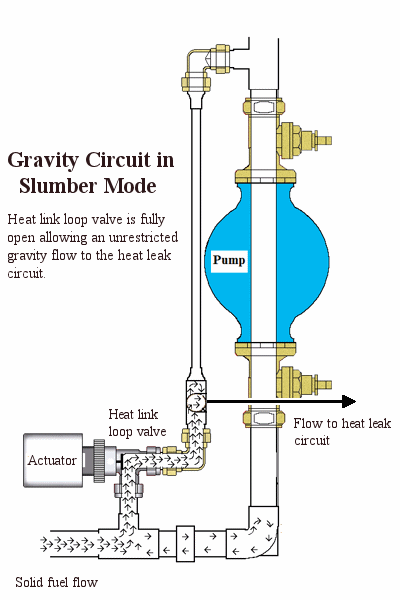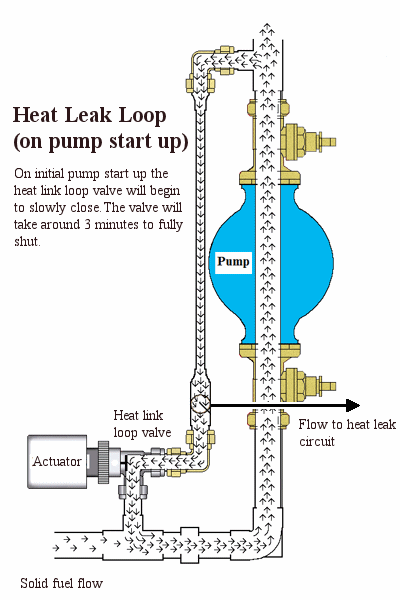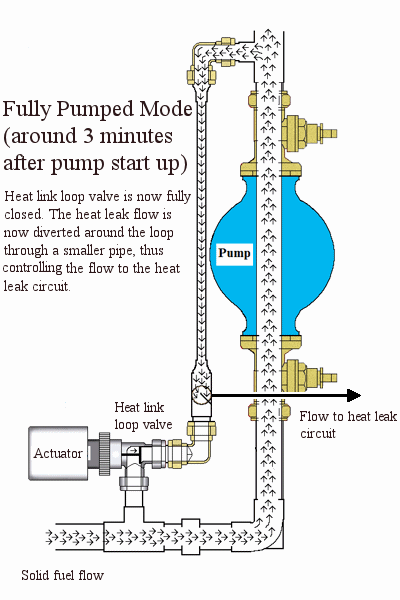Mill Hill Cottage Plumbing & Heating Ltd
(Previously
Heating Innovations)

|
       
|
| Proposed
new building regulations requires the pump does not have any uncontrolled
gravity circulation pass through it when it is not running. In order to future proof
our control systems we feel it is has been prudent introduce
a modification for the gravity circuit to bypass the pump on all our new
panels.
Whilst introducing a pump bypass loop is relatively straight forward it is
still a major modification for us requiring new jigs etc, so we have taken
this opportunity to make several improvements to the panel to further
increase performance.
|
|
1. First objective for the gravity circuit to bypass the pump
allowing unrestricted flow to the heat leak circuit. |
|

|
Status.
Solid fuel appliance is firing in slumber mode with gravity
circuit functioning.
Heat Leak Loop Valve -
Normal position sprung open allowing unrestricted flow to heat leak
circuit.
Gravity circulation to
- hot water cylinder.
- heat leak circuit. (unrestricted)
|
|
|
2. To gradually wean the heating system up
to the circulating pressure when the pump when it initially starts. In
some installations, when the header tank was installed fairly close to the
H2 panel it sometimes pulled a small amount of air into the system when
the pump first switched on. Slowly closing the heat link loop valve over
a period 3 minutes greatly reduces the shock of the initial pump start up. |
 |
Status.
Solid fuel appliance is firing and the flow has reached 58°C,
activating the pump.
Heat Leak Loop Valve -
begins to close, loop recycles and
gradually reduces to nil over approximately 3 minutes.
When the water leaving the solid fuel appliance reaches
58°C, a dry well thermostat (aquastat) will switch to "make on
rise" and send a switched live to the H2 panel and the pump will
switch on.
The heat leak link valve begins to
close, taking around 3 minutes to fully shut
For the first three minutes, the new heat leak loop will recycle back
through the heat leak loop valve into the pump supply pipe reducing the full pull of
the pump on the heating system. This 'soft start' when the pump is
initially activated very much reduces the sudden pull exerted on the open vent. which in certain cases could pull a small
amount of air down the open vent into the heating system each time the
pump is switched on.
Pumped circulation to
- hot water cylinder.
- heat leak circuit.
The heat leak loop recycles and
gradually reduces to nil over approximately 3 minutes.
|
|
|
| 3. On the original H2 panel the gravity heat
leak connection is fitted onto the pipework downstream from the pump, when
the H2 system is in slumber mode, the gravity heat leak flow had to pass
through the static centrifugal impeller of the pump on its way to the heat
leak circuit.
In slumber mode (pump not working) the principal worked fine but when
the H2 panel was in pumped mode the heat leak gravity circuit was
force-fed by the pump. This created a problem with too much heat being
pushed into the gravity circuit which proved difficult to adjust and get
the right balance on the actual radiator/s.
If the circuit was to be restricted in pumped mode, (by the installer
of the H2 panel) then it would also be restricted in gravity mode and
reduce the gravity circulation, which would defeat the object of having
the gravity heat leak circuit.
To reduce the effect of to heat leak circuit robbing the rest of the
system of energy we have diverted the heat leak flow through a smaller
pipe when the system is fully pumped. |
 |
Status.
Solid fuel appliance is firing and the flow has reached 58°C,
activating the pump.
Heat Leak Loop Valve - Electronically
closed to shut off the recycling circuit around the heat leak loop.
The heat leak diverter valve is fully shut, the pumped heat leak flow
is now diverted through a small bore pipe controlling the flow rate to the heat
leak radiator.
Pumped circulation to
- hot water cylinder.
- heat leak circuit. (restricted)
The heat leak loop ceased to recycle.
|
|
4. When the H2 panel was first designed cylinders were expected to be
heated in an hour and that was what the H2 was based upon. Modern day
system design requires the hot water cylinder to be heated in half that
time and the upgraded H2 panel has been modified to do that by simply
increasing the size of the supply pipe on the panel.
|
|

Contact Mill
Cottage Plumbing & Heating Ltd
Technical Support and
Sales
Telephone 01354
653854
|
|
|
|
|
|
|
|